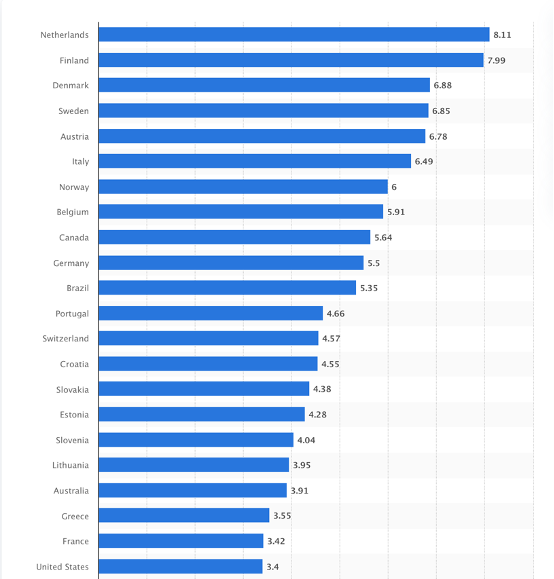
In this article, Camille Keller (ESSEC Business School, Bachelor in Business Administration (BBA), 2020-2024) explores coffee’s global consumption trends, examining regional habits, cultural significance, and emerging preferences.
Coffee: A Universal Obsession
Coffee holds the distinction of being the second most consumed beverage in the world after water. With an estimated 10 billion kilograms consumed annually in 2023, according to the International Coffee Organization’s latest global report, coffee plays a central role in daily life for millions. While its appeal began in regions like the Middle East and Europe, its reach has extended to every corner of the globe. In traditionally tea-drinking nations like China and India, coffee is steadily gaining popularity, driven by urbanization and an expanding middle class.
The cultural significance of coffee is evident in how it is integrated into the lifestyles of various regions. In Italy, espresso is more than just a drink; it is a tradition, often consumed while standing at the bar. In the United States, coffee fuels the on-the-go culture, with chains like Starbucks shaping global perceptions of coffee consumption. Meanwhile, in Scandinavian countries, coffee consumption is a communal affair, often paired with “fika,” a Swedish custom of taking a break with coffee and pastries. Across regions, coffee’s versatility allows it to adapt to local customs, cementing its place in daily routines worldwide.
Espresso bar in Italy

Source: Shutterstock.
Regional Consumption Patterns: Who Drinks the Most?
The world’s coffee consumption reveals fascinating disparities across regions. Europe remains the leader, with Northern European countries like the Netherlands, Finland, and Denmark topping the per capita consumption charts. According to Statista in 2023, the Netherlands leads with an impressive 8.11 kilograms per person annually, followed closely by Finland at 7.99 kilograms. These figures underscore a deeply ingrained coffee culture in these regions, where coffee is not just a beverage but a social ritual.
Meanwhile, the United States, the largest single market for coffee, ranks significantly lower in per capita consumption, averaging around 4 kilograms per person annually. This contrast highlights a distinct cultural difference: as noted by Jacobsen (2024), Americans predominantly favor convenience and mass-market coffee, which aligns with the rise of chain brands and ready-to-drink formats. This reflects a broader trend in the U.S., where coffee consumption habits are driven by practicality rather than the artisanal focus seen in Europe.
Per Capita Coffee Consumption in 2023

Source: Statista.
Asia, once dominated by tea, has emerged as a growing market for coffee. Countries like Japan and South Korea have embraced coffee culture, with specialty cafes and innovations like canned coffee becoming mainstream. China’s coffee market, although nascent, is expanding rapidly, driven by a young, urban demographic eager to adopt global trends. Latin America, home to many coffee-producing countries, is seeing a shift from exporting to cultivating local appreciation, with Brazil and Colombia leading domestic consumption in the region.
Urbanization and changing lifestyles play a significant role in driving coffee consumption. As more people move to cities, the demand for convenient and premium beverages increases. Younger generations, in particular, are drawn to coffee not only for its energizing properties but also for its social and aesthetic appeal, as showcased on platforms like Instagram.
Transforming Habits: Sustainability and Evolving Preferences
The coffee industry is undergoing a profound transformation, driven by shifting consumer values and evolving preferences. Sustainability now plays a pivotal role in purchasing decisions, particularly among younger consumers. Research by Robichaud and Yu (2022) highlights that Generation Z (aged 15–24) places increasing importance on ethical and sustainable consumption, with certifications like Fair Trade and Rainforest Alliance acting as key motivators. These certifications ensure that coffee production aligns with ethical labor practices, environmental conservation, and fair wages for farmers, reflecting the growing demand for transparency and social responsibility.
In parallel, the rise of connoisseur consumers—those who seek high-quality specialty coffee—has emphasized the importance of sustainability in production. As noted by Bartoloni et al. (2022), this segment values not only the taste and uniqueness of coffee but also its environmental and ethical footprint. For these discerning drinkers, coffee consumption is as much about supporting sustainable practices as it is about enjoying a premium product.
Evolving preferences are also shaping the industry. The increasing popularity of plant-based diets has led to the widespread adoption of non-dairy alternatives like almond, oat, and soy milk in cafés worldwide. Cold brew, once considered niche, has become a mainstream favorite, particularly among millennials and Gen Z consumers, who gravitate towards innovative and convenient formats. The growth of ready-to-drink coffee beverages reflects this trend, offering busy consumers a blend of convenience, variety, and sustainability in packaging and sourcing.
Health-conscious consumers further influence the market by demanding options such as low-caffeine, organic, and functional coffee infused with superfoods like turmeric and collagen. These preferences align with broader wellness movements and reflect a shift in how coffee is perceived—not just as a beverage but as a lifestyle choice. Together, these changes signal a new era in the coffee industry, where sustainability and innovation go hand in hand.
Why Should I Be Interested in This Post?
Global coffee consumption reflects broader trends in sustainability, wellness, and innovation. For ESSEC students interested in understanding global markets or sustainable trade practices, this article highlights important insights into consumer behavior and industry dynamics.
Related Posts on the SimTrade Blog
▶ Alexandre VERLET Classic brain teasers from real-life interviews
Useful Resources
International Coffee Organization (ICO)
Specialty Coffee Association (SCA)
About the Author
The article was written in January 2025 by Camille Keller (ESSEC Business School, Bachelor in Business Administration (BBA), 2020-2024).
